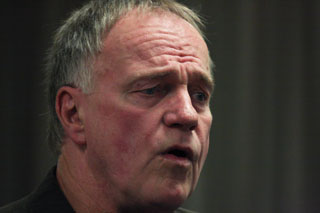Steidl speaks out on death penalty
Randy Steidl stood in front of a crowded conference room in a brown jacket and slacks with a polished appearance. Looking at that man, one would never guess he was incarcerated for 6,305 days, spending years on death row.
On Fourth of July weekend in 1986, Dyke and Karen Rhoads were murdered in their home in Paris, Ill.
The town of 8,000 was completely shocked.
Three days later, Steidl left work and went to a local bar to have a couple drinks over a game of pool.
The phone rang from behind the bar.
It was for Steidl.
The police asked him to come down to the police station for questioning. Moments later the police came into the bar to pick Steidl up.
For 2.5 hours, Steidl was questioned.
“I was always under the impression if you told the truth you had nothing to worry about,” he said.
Steidl had an alibi for the weekend that was verified by witnesses in the parking lot.
However, when he returned to the bar later that night, the room was a buzz with rumors.
For seven months, the rumors followed Steidl, until Feb. 19, 1987, when five police officers showed up at his front door.
He was read his rights and arrested for the double murder of Dyke and Karen Rhoads.
“I was scared to death and mad,” Steidl said.
Steidl paced in a holding cell until his younger brother, a recently hired state police officer, pulled up a stool in front of him. He was told if he confessed, they would not consider the death penalty.
Steidl said he had nothing to confess.
“They just don’t arrest people that aren’t guilty,” his brother responded.
His brother left to tell their family he did not confess.
Steidl got an attorney and had high hopes for the trial.
“I still had faith in the system,” Steidl said.
The trial lasted seven days.
Steidl had faith in the system until day two of the trial.
“This is when I started to see it was hopeless,” Steidl said.
For six hours, the 24 jurors were out debating its decision on the final day.
As the jury walked into the room, Steidl tried to get some glimpse of what the vote would be, but he said he felt a hole in his stomach grow as he looked at them.
Each one had their faces pointed to their toes.
The verdict was read: guilty.
“In 97 days, I went from the comfort of my home to death row,” Steidl said.
Even after the sentence, Steidl still had faith in the system.
For years, Steidl petitioned and was sent back to death row twice and let off to serve life in prison.
Investigations, petitions and hearings continued for 17 years.
But on a bright day in May of 2004, Stiedl was released from all charges.
And still, after he left the prison, he was told he still was not innocent.
“I wasn’t released because of the system, I was released in spite of the system,” Steidl said.
Steidl’s story is one of 20 innocent men wrongfully accused and sentenced to death in the state of Illinois.
He shared his story with the Eastern community as part of a presentation by the Students for Life, a group from the Newman Catholic Center that is pro-life, on Monday night.
Kara Davis, the organizer for the group, said all life is worth protecting.
“It’s one thing to say that’s tragic, but its another to take action,” Davis said. “Life is worth protecting if it’s a person on death row or an infant.”
Steidl works for the Illinois Coalition to Abolish the Death Penalty along with Colleen Cunningham, who hosts talks such as Steidl’s across the state.
The coalition had post cards for students and community members alike to fill out and sign to send to legislatures in Springfield to veto the death penalty.
“Why do we have the capital punishment if we have an alternative?” Steidl said. “Its not worth the risk of possibly killing innocent people.”
Steidl, who believed in the death penalty before his experience, said he now believes life without parole is a better form of punishment and is a worse punishment anyways.
“You are in a 4-by-8 feet cage with another inmate,” Steidl said. “You have bars all around you knowing it will be like this until the day you die, but the death penalty is not worth the risk.”
Jessica Franklin, a junior psychology major, showed up to the event and filled out a post card to send of the state legislature after the event.
“It’s not something I think about every day, but I didn’t know innocent people were sentenced to death. His story really opened my eyes,” Franklin said.
Cunningham said a rally is planned to take place Nov. 16 in Springfield to voice their opinions on repealing the death penalty.
Kayleigh Zyskowski can be reached at 581-7942 or dennewsdesk@gmail.com.
Steidl speaks out on death penalty

Randy Steidl talks about his experience of being wrongly convicted and sentenced to death row Monday night in the Oakland room of the Martin Luther King Jr. University Union. Steidl was sent to prison in 1987 and was released in 2004. He spent a total of





































































